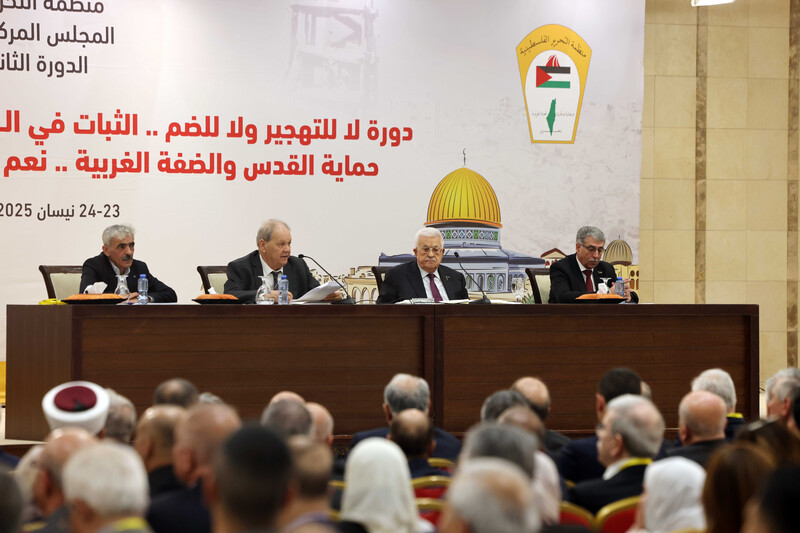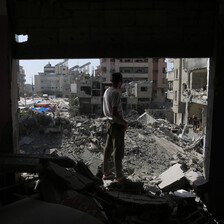5 August 2025

Mahmoud Abbas attends a meeting of the Palestine Liberation Organization Central Council today in Ramallah on 23 April.
APA imagesAs famine hits hard, and Israel’s genocide in Gaza ticks past 22 months – with still no sign of serious intervention from outside – Palestinian political divisions are exacerbating one of the darkest moments in Palestinian history.
Israel has made its plan clear: it wants all of Palestine’s land but none of the people.
Since US President Donald Trump openly endorsed the idea of “voluntary migration” for Palestinians in Gaza to other countries, the concept has gained renewed traction among several Israeli ministers.
But Mahmoud Abbas’s Palestinian Authority has remained sidelined during Israel’s genocidal aggression in Gaza and impotent in the face of ceaseless settlement expansion and settler violence in the West Bank.
When Abbas did recently speak, he accused Hamas of giving Israel a pretext to continue its genocide by holding Israeli captives, describing the movement in crude and offensive terms.
These statements drew widespread condemnation, with many seeing them as equating the victim with the oppressor and undermining chances of unity.
Hamas rejected the remarks as insulting. Senior official Basem Naim said Abbas was blaming “the crimes of the occupation and its ongoing aggression on our people.”
Mustafa Barghouti, head of the Palestinian National Initiative party, said Abbas’s statements only deepen internal division — a division that started in 2006 when Hamas won parliamentary elections before the movement ousted Fatah from Gaza in 2007.
This divided the 1967-occupied Palestinian territories, placing Gaza under Hamas rule and leaving the PA in control of less than half of the West Bank.
Barghouti said that it was completely unacceptable to blame the victims for crimes committed against them by the Israeli occupation for more than 100 years, through 1948, 1967 and the current appalling situation in both the West Bank and Gaza.
Ethnic cleansing plans
Meanwhile, Israel is ploughing on with its designs to pillage what is left of Palestine and cleanse it of its people.
On 23 July, the Israeli parliament overwhelmingly voted to annex the entire West Bank to Israel – a long-standing Israeli goal.
Israeli Finance Minister Bezalel Smotrich is a fervent proponents of annexation. In Gaza, his top stated priority is the continuation of the genocide to eliminate Hamas, even at the expense of Israeli captives in the enclave.
He has been clear about the aim to empty Gaza of its people.
Israel Katz, Israel’s defence minister, has meanwhile laid out plans to force all Palestinians in Gaza into a “humanitarian city” – or concentration camp – on the ruins of Rafah, in a scheme that legal experts and academics described as a “blueprint for crimes against humanity.”
Palestinians would go through “security screening” before entering, and once inside would not be allowed to leave, Katz said at a briefing for Israeli journalists in early July.
Eventually the entire population of Gaza would be housed there. Then Israel aims to implement “the emigration plan, which will happen,” the Israeli daily Haaretz quoted him as saying.
This is not a new idea.
According to a research paper by the Arab Center for Research and Policy Studies, Israel has sought to depopulate Gaza since the late 1940s and the establishment of Israel with the ethnic cleansing of over 850,000 people during 1947-49 – known as the Nakba.
In 1956, when Israel briefly occupied Gaza during the Suez war, then-Finance Minister Levi Eshkol allocated half a million dollars to create conditions favorable for displacement.
Divided we fall
Multiple such attempts followed.
The plans to expel Gaza’s population persisted beyond the 1967 occupation. Declassified Israeli government documents revealed that removing Palestinians from Gaza was a strategic priority, but plans foundered on Jordan’s refusal to consider taking any more refugees.
Israel also sought to relocate Gazans to Latin America, and even struck a 1969 agreement with Paraguay to receive 60,000 Palestinians in exchange for financial compensation.This effort collapsed following a shooting inside the Israeli consulate there.
After October 2023, the Israeli Ministry of Intelligence drafted an official policy paper explicitly calling for the expulsion of Gaza’s population to Egypt’s Sinai Peninsula.
The paper dismissed any option that would leave Palestinians in place – whether under PA control or a local administration supervised by Israel.
Today Israel is working – publicly and behind closed doors – to convince other countries to accept as many Palestinian refugees as possible.
Do Palestinian leaders truly grasp the severity of Israel’s intentions? Is there any existing Palestinian project aimed at reinforcing Palestinian rootedness in Gaza and the West Bank to counter the Israeli agenda? Is there any serious effort at unifying the Palestinian people?
These questions still lack clear answers. But one thing seems increasingly certain: the continuation of this internal discord may become the greatest gift handed to Israel’s ongoing displacement project – one that began in 1948 and may soon result in a new Nakba in Gaza.
What perhaps frightens Palestinians the most, as my photographer neighbor Muhammad al-Taaban, 20, put it, is this:
“I don’t want to leave my homeland, but if things continue like this, I feel like I’ll have no choice. Displacement comes one step closer every day. It feels like our politicians are leaving us to face this crisis alone, as if we are not one people.”
Hassan Abo Qamar is a writer based in Gaza.





